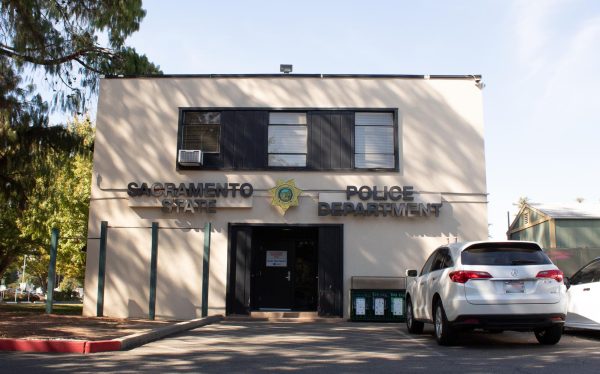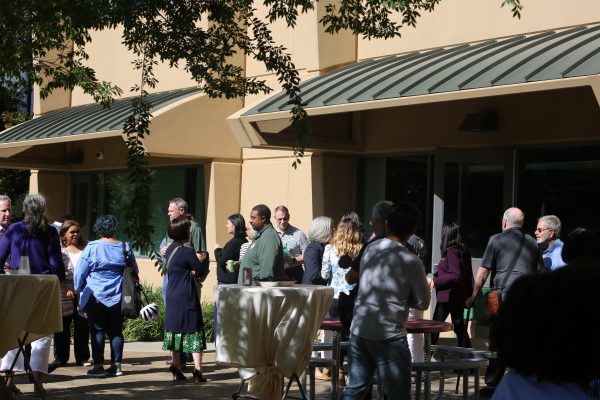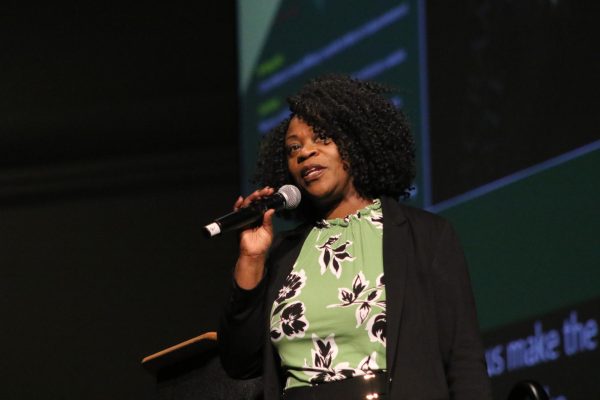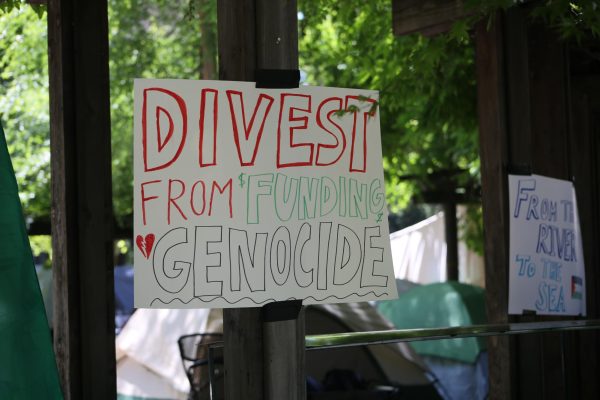Donor?s past prompts many to engage in campus history
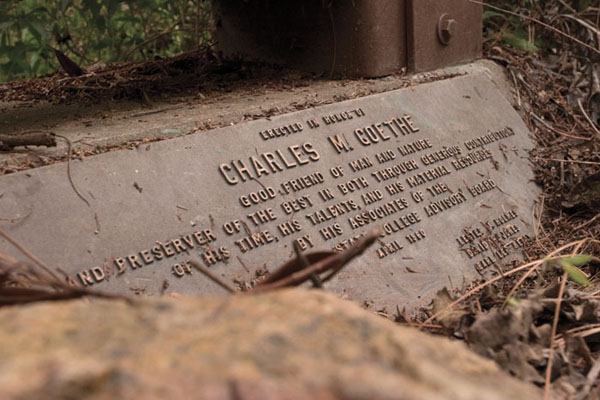
goethe:Charles Goethe, a major donor to Sac State, is honored as ?friend of man and nature and a preserver of the best in both,?by a plaque in the arboretum on campus. :Julie Keefer – State Hornet
March 24, 2010
Money from a controversial Sacramento State donor is still in use today, prompting some to question the university’s engagement with its past.
The university honored Charles M. Goethe after his tens of thousands of dollars in donations, which began in the 1940s and continued until his death in 1966. Goethe was a leader in the California eugenics movement, a scientific movement popular in the 1920s and “30s, which sought to breed a “master race” through selective breeding of classes deemed “unfit.”
Tony Platt, professor emeritus at Sac State and leading researcher into Goethe’s relationship with the university, said the university has not engaged in its past in a serious way.
“They have just sort of stonewalled it and hoped it would go away,” Platt said.
Goethe was the president of the Eugenics Research Association. In this role he funded and contacted prominent eugenicists in Europe, southern California and the East Coast. In his 1936 presidential address, he hailed Nazi Germany’s “honest yearnings for better population.”
Goethe was active in his role as a banker to racially segregate Sacramento. For instance, Goethe stopped selling real estate to Mexicans because “they cannot grasp the theory of contracts, as do even the Negroes who are coming up from the South in considerable numbers.”
Chloe Burke, history professor, said the university knew about Goethe’s beliefs.
“He was very upfront about his beliefs,” Burke said. “He was an avowed eugenicist, and really held to a profound commitment to racially inequality.”
In the 1950s, Goethe was appointed to the university’s advisory board as its first chairman, and was given an honorary degree in science. Goethe had a new science building and an arboretum on campus named after him in the 1960s.
Guy West, president of Sac State at the time, called Goethe “Sacramento’s most remarkable citizen.”
When Goethe died in 1966, his will left Sac State as his primary benefactor, leaving behind $653,000, the Charles Goethe Mansion and most of his papers and personal library.
University Enterprises Inc., then known as the University Foundation, has handled the money and Goethe’s mansion since it was donated. Today, much of the money is still in use, funding mostly biology professors’ research.
Ruth Ballard, professor of biology and director of the Goethe Committee, which handles the money from Goethe’s donations, said she saw no problem with using the money.
“I see no downside in having the money and using it,” Ballard said. “Especially since we’re not using it for eugenics studies. But I’m not a expert on ethics.”
Platt suggested the money be used for research that would be critical of the views Goethe held, or for scholarships to students.
“The biology department never stopped to think, “What does it mean to have this money?'” Platt said. “I’m not suggesting they give up money, but I think they should have, and they still can, do something to counter what Goethe did.”
In 2005, Platt submitted a request for a grant from the Goethe Bequest to conduct research on Goethe. The Goethe Committee denied the request because it was likely Platt would be critical of Goethe.
The rejection letter noted the “use of funds from the C.M. Goethe Bequest to expose or undermine the donor himself – no matter how abhorrent his views seem to educated people today – is inappropriate.”
Platt appealed to the provost and President Alexander Gonzalez, citing a violation of academic freedom, but no action was taken.
Ballard said the rejection was following common sense and the intentions of Goethe’s will.
Gonzalez was unable to be reached for comment.
“If I donate money, I would not want it to go to diss me,” Ballard said.
Ballard said the will specifies that the money should go toward surveys or studies into human genetics, but the committee gives money to other science-related projects as well.
“But to move the money into something completely different, I couldn’t justify,” Ballard said.
Platt said the university’s interpretation of the will was self-serving and rejected the claim that the money could not be used to challenge Goethe.
“There is a lot of flexibility when people leave you money on what you can do with it,” Platt said. “Goethe wanted the bulk of the money to be used for ‘eugenics,’ but the university was able to define this in such a way that they could distance itself from his explicit racism.”
In his research paper on Goethe, Platt said Goethe’s wish for his home to be a “eugenic museum” was discarded by UEI, which sold of most his library and possessions to an undisclosed buyer.
Platt said UEI’s handling of the Goethe funds has been “marked by conflict of interest, inconsistency and a failure to imaginatively explore how the bequest might best serve the entire university community.”
In 2005 Platt and Burke held a symposium titled “From Eugenics to Designer Babies: Engineering the California Dream.” At the symposium, Goethe’s history with the university was addressed, and a gallery featuring many of Goethe’s personal diaries and letters was displayed.
“The university was generally supportive of the symposium,” Burke said. “No one on campus kept us from exploring this history.”
Burke said she wished she could have gone further in exposing and engaging the past, and believes the university as an institution has still not fully addressed the past.
“The university wanted to forget that they benefited from an association with someone who held beliefs that we consider to be abhorrent,” Burke said. “They took the route that a lot of institutions did, which was to erase traces of the past.”
After the symposium, the C. M. Goethe arboretum was renamed University Arboretum.
“They didn’t make any announcement or anything,” Platt said. “They just did it.”
The Charles Goethe Mansion was also renamed after its architect, Julia Morgan, in 2003.
The city of Sacramento renamed some of its public spaces as well. After citizen protest, Goethe Park was renamed Riverbend Park, and C. M. Goethe Middle School was renamed Rosa Parks Middle School.
Today, the arboretum still contains a large cross-section of a redwood donated by Goethe. A plaque on the bottom of the redwood honors Goethe, calling him a “friend of man and nature and a preserver of the best in both.”
Burke said she recognized the challenges in addressing Goethe’s history.
“How do you address these sorts of histories?” Burke said. “A lot of people knew Goethe as a benefactor and someone who supported conservation causes.”
History must be addressed, however, by the university as institution if it wants to understand who it is, Burke said.
“History is who we are now,” Burke said. “Unless we engage with the past, we don’t fully understand who we are today.”
Timothy Sandoval can be reached at [email protected].


























































































































